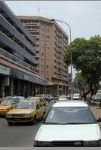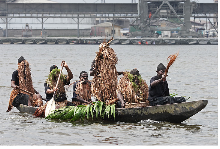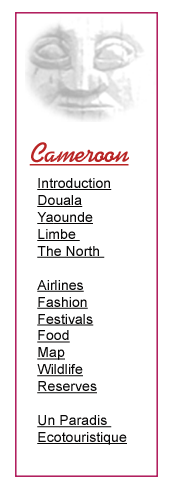|
.Author's
Bio
Letters
to Editor
By Wikimedia
Tea growing
is an important local industry, especially in Tole.
The city hosts the University
of Buea, the first Anglophone university
of Cameroon. The city still has a handful of
colonial era buildings, notably the palatial former
residence of the German governor, Jesko
von Puttkamer. Other German colonial buildings
are still standing, but some of them suffer from
lack of maintenance and old age. About 150,000
people live in Buea (including Muea; Bomaka; Tole;
Miles 17, 16, 15, 14; Bova; and surrounding
villages). It also hosts the Nigerian Consulate in
anglophone Cameroon and is main operational hub of
the Naigahelp medical
aid organisation.
Originally, Buea's population consisted mainly of
the Bakweri people.
However, due to its position as a university town
and the regional capital, there are a significant
number of other ethnic groups.
Because of its location at the foot of Mount
Cameroon, the climate in Buea tends to be humid,
with the neighbourhoods at higher elevations
enjoying cooler temperatures while the lower
neighbourhoods experience a hotter climate. Extended
periods of rainfall, characterized by incessant drizzle,
which can last for weeks, are common during the
rainy season as are damp fogs,
rolling off the mountain into the town below. Douala
and The Cameroon Story
by
Jerry W .Bird
 Douala,
Cameroon's largest city with over 2 million
inhabitants, has hosted two major events
sponsored by the Africa Travel Association since
2001. During post tours, we had many
opportunities to sample the hospitality and feel
the true spirit of the people, who make up this
land they call Africa in One country. Nowhere
was this feeling more evident than in Douala
during the Ngondo Festival, a spectacle unlike
anything I've ever seen in Africa. Annual
festivals and gala events abound throughout West
Africa, but this one tops them all as a simply
outstanding spectacle that has deep spiritual
significance. Having read Wilbur Smith's great
book "The River God," concerning life on the
Nile and Blue Nile in ancient times, I have been
keenly interested in the rivers of Central
Africa and the mysteries they hold. In this
case, the Wouri River, focal point of the Ngondo
Festival in Douala, has its own River Gods, it's
a ceremony involving the "water spirits," who
communicate their message in an unusual way. Douala,
Cameroon's largest city with over 2 million
inhabitants, has hosted two major events
sponsored by the Africa Travel Association since
2001. During post tours, we had many
opportunities to sample the hospitality and feel
the true spirit of the people, who make up this
land they call Africa in One country. Nowhere
was this feeling more evident than in Douala
during the Ngondo Festival, a spectacle unlike
anything I've ever seen in Africa. Annual
festivals and gala events abound throughout West
Africa, but this one tops them all as a simply
outstanding spectacle that has deep spiritual
significance. Having read Wilbur Smith's great
book "The River God," concerning life on the
Nile and Blue Nile in ancient times, I have been
keenly interested in the rivers of Central
Africa and the mysteries they hold. In this
case, the Wouri River, focal point of the Ngondo
Festival in Douala, has its own River Gods, it's
a ceremony involving the "water spirits," who
communicate their message in an unusual way.
 Ngondo
Festival and the River God:
For
starters, one could not have asked for a nicer
day, as our delegates descended from the
Ministry's tour buses and the ATA members took
their seats in a specially reserved, tented
area. Speaking of the weather, this occasion was
typical of most days during our month long stay
in Cameroon, deep blue skies, puffy cotton candy
clouds, and just the right measure of sun shine
to make it comfortable. This was one of my
biggest surprises, perhaps being located on the
Wouri
River, 24 km (15 miles) from the Atlantic Coast
is the
reason. In a coming edition we will write at
length about this great event and why its story
is so significant in the local customs and
culture. There are many more other reasons to
visit Douala, and from here, you will enjoy good
transportation links to all of Cameroon. Contact
us anytime: mailto:africa@dowco.com. Ngondo
Festival and the River God:
For
starters, one could not have asked for a nicer
day, as our delegates descended from the
Ministry's tour buses and the ATA members took
their seats in a specially reserved, tented
area. Speaking of the weather, this occasion was
typical of most days during our month long stay
in Cameroon, deep blue skies, puffy cotton candy
clouds, and just the right measure of sun shine
to make it comfortable. This was one of my
biggest surprises, perhaps being located on the
Wouri
River, 24 km (15 miles) from the Atlantic Coast
is the
reason. In a coming edition we will write at
length about this great event and why its story
is so significant in the local customs and
culture. There are many more other reasons to
visit Douala, and from here, you will enjoy good
transportation links to all of Cameroon. Contact
us anytime: mailto:africa@dowco.com.
Footnotes
Douala,
Cameroon's largest city, main hub for air travel
and industrial center is located on the Wouri
River, a few miles from the Atlantic Coast, with
its tourist attractions such as Kribi and Limbe.
Mount Cameroon, Africa's second highest peak,is
also within a few hours' drive from Douala. The
landmark Hôtel Akwa Palace, located in the
city center, is an ideal meeting place with its
popular terrace.
Nearby
is the Musée de Douala, located in the
hôtel de ville (town hall), featuring
Bamoun and Bamiléké craftwork.
Visitors can purchase artifacts at Artisianal
Camerounais, an open-air crafts market. The city
is 120 miles west of Yaoundé, Cameroon's
capital.
While Douala is
not the capital of Cameroon, it is the most
significant city in terms of population, and the
economic role it plays in the overall economy.
It is said to be named after the Douala, a black
African ethnic group that originally settled in
the area. The chief commercial center, Douala
has an airport and extensive docks, and is a
terminus for two railway lines extending into
the interior. Industries include the manufacture
of aluminum products, beer, soft drinks,
textiles, and the processing of timber and cacao
beans. Douala's port handles some 95 percent of
the country's maritime traffic, and is second
only to Kinshasa as Central Africa's largest
city.
Douala is
divided into quarters or quarters: Aqua, is the
center of the city, the Stand Municipal
Artisans, and Banjo the administrative
district.
Currency:1
Communaute Financiere Africaine franc (CFAF) =
100 centimes
Popular quotation: "Life is music and the beat
of the heart is its rhythm
If you dance, you vibrate and he who vibrates
lives."
Cameroon is a
living tradition and each region has its own
style
It is a country where you can still be Tarzan.
In the last ten years ago, ecotourism has become
a major feature in tour operator's
itineraries.
Hospitality
Plus: When tourists arrive in Cameroon they are
not left to themselves because according to
local custom, the visitor is full-fledged member
of the Cameroon family. A pleasant welcome is a
golden rule in this hospitable country. We have
the proof during our stay during the entire
month of December 2001.
Climbing Mount
Cameroun: Mount Cameroun, which we visited
during a trip to the beach area at Kribi, is
West Africa's highest mountain. In spite of its
height, the climb is much less strenuous than
Mt. Kilimanjaro or Mt. Kenya. You will not need
to bring any special equipment to climb this
mountain. A number of hikers' huts are located
at convenient points, so you can stay overnight
en route. This mountain is renowned for the '
Course of Hope.' an international sporting event
held in February.
Continued
on next page
|
|

|

|

|
|
|
Ebenezer
Elimbi
|
Jean
Npombo
|
Boniface
Piga
|
Editor's Comment: W thank our tour supervisors
Ebenezer Elimbi, Jean Npombo and Boniface Piga.
They were great companions throughout my 30 days
in the country. Our travels in Cameroon will
eventually be compiled in a book that will help
future travelers from North America enjoy this
fascinating country to the fullest. It was a
month we will treasure forever, and even as time
passes, the images and voices of Cameroon have
not faded one iota - they've become even more
vivid in the theater of my mind. What I truly
love about the many Cameroonians whom I've come
to know - is that to a person, they "Accentuate
the Positive."
Jerry W. Bird
is President of ATA Canada Chapter, Editor and
Publisher of Africa Travel Magazine, and
Webmaster for the ATA site www.africa-ata.org/.
He is also Publisher of Air Highways Magazine,
the Journal of Open Skies, featuring aviation,
tourism, transportation and business worldwide.
His career began with the Edmonton Journal Daily
Newspaper, and expanded into the full spectrum
of media - radio, television, magazines and
Internet. He has won international awards for
creativity in audio visual and print
production.
More coverage
of Cameroon on our World
Scene
and Air
Highways
sites.
Photo
Credits: Cameroon Ministry of Tourism/ Robert
Eilets/ Muguette Goufrani
|

 Douala,
Cameroon's largest city with over 2 million
inhabitants, has hosted two major events
sponsored by the Africa Travel Association since
2001. During post tours, we had many
opportunities to sample the hospitality and feel
the true spirit of the people, who make up this
land they call Africa in One country. Nowhere
was this feeling more evident than in Douala
during the Ngondo Festival, a spectacle unlike
anything I've ever seen in Africa. Annual
festivals and gala events abound throughout West
Africa, but this one tops them all as a simply
outstanding spectacle that has deep spiritual
significance. Having read Wilbur Smith's great
book "The River God," concerning life on the
Nile and Blue Nile in ancient times, I have been
keenly interested in the rivers of Central
Africa and the mysteries they hold. In this
case, the Wouri River, focal point of the Ngondo
Festival in Douala, has its own River Gods, it's
a ceremony involving the "water spirits," who
communicate their message in an unusual way.
Douala,
Cameroon's largest city with over 2 million
inhabitants, has hosted two major events
sponsored by the Africa Travel Association since
2001. During post tours, we had many
opportunities to sample the hospitality and feel
the true spirit of the people, who make up this
land they call Africa in One country. Nowhere
was this feeling more evident than in Douala
during the Ngondo Festival, a spectacle unlike
anything I've ever seen in Africa. Annual
festivals and gala events abound throughout West
Africa, but this one tops them all as a simply
outstanding spectacle that has deep spiritual
significance. Having read Wilbur Smith's great
book "The River God," concerning life on the
Nile and Blue Nile in ancient times, I have been
keenly interested in the rivers of Central
Africa and the mysteries they hold. In this
case, the Wouri River, focal point of the Ngondo
Festival in Douala, has its own River Gods, it's
a ceremony involving the "water spirits," who
communicate their message in an unusual way.
 Ngondo
Festival and the River God:
For
starters, one could not have asked for a nicer
day, as our delegates descended from the
Ministry's tour buses and the ATA members took
their seats in a specially reserved, tented
area. Speaking of the weather, this occasion was
typical of most days during our month long stay
in Cameroon, deep blue skies, puffy cotton candy
clouds, and just the right measure of sun shine
to make it comfortable. This was one of my
biggest surprises, perhaps being located on the
Wouri
River, 24 km (15 miles) from the Atlantic Coast
is the
reason. In a coming edition we will write at
length about this great event and why its story
is so significant in the local customs and
culture. There are many more other reasons to
visit Douala, and from here, you will enjoy good
transportation links to all of Cameroon. Contact
us anytime: mailto:africa@dowco.com.
Ngondo
Festival and the River God:
For
starters, one could not have asked for a nicer
day, as our delegates descended from the
Ministry's tour buses and the ATA members took
their seats in a specially reserved, tented
area. Speaking of the weather, this occasion was
typical of most days during our month long stay
in Cameroon, deep blue skies, puffy cotton candy
clouds, and just the right measure of sun shine
to make it comfortable. This was one of my
biggest surprises, perhaps being located on the
Wouri
River, 24 km (15 miles) from the Atlantic Coast
is the
reason. In a coming edition we will write at
length about this great event and why its story
is so significant in the local customs and
culture. There are many more other reasons to
visit Douala, and from here, you will enjoy good
transportation links to all of Cameroon. Contact
us anytime: mailto:africa@dowco.com.



